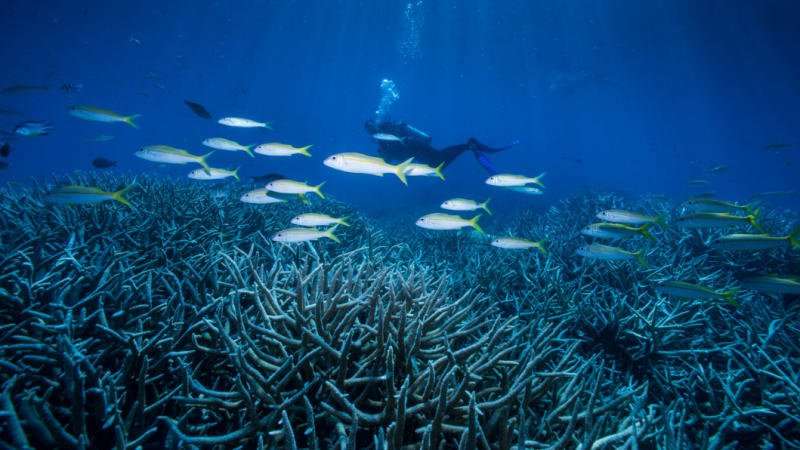1.5 degrees is the most stringent and ambitious goal in that agreement, originally put there at the behest of small island nations and other highly vulnerable countries. But it is increasingly being regarded by all as a key guardrail, as severe climate change effects have been felt in just the past five years - raising concerns about what a little bit more warming would bring. Loading "Half a degree doesn't sound like much til you put it in the right context," says Durwood Zaelke, president of the Institute for Governance and Sustainable Development. "It's 50 per cent more than we have now." The idea of letting warming approach 2 degrees increasingly seems disastrous in this context. Parts of the planet, like the Arctic, have already warmed beyond 1.5 degrees and are seeing alarming changes. Antarctica and Greenland, containing many feet of sea-level rise, are wobbling. Major die-offs have hit coral reefs around the globe, suggesting an irreplaceable planetary feature could soon be lost.
It is universally recognised that the pledges made in Paris would lead to a warming far beyond 1.5 degrees - more like 2.5 or 3 degrees, or even more. And that was before the United States, the world's second-largest emitter, decided to try to back out. Australia’s climate pollution rose by 1.3 per cent in the year to March – the highest quarterly rise in eight years - according to an official report released last month. "The pledges countries made during the Paris climate accord don't get us anywhere close to what we have to do," says Drew Shindell, a climate expert at Duke University and one of the authors of the IPCC report. "They haven't really followed through with actions to reduce their emissions in any way commensurate with what they profess to be aiming for." An iceberg melts in Kulusuk, Greenland, near the Arctic Circle. Parts of the planet, like the Arctic, have already warmed beyond 1.5 degrees. Credit:AP The new 1.5 degree report will feed into a process called the "Talanoa Dialogue," in which parties to the Paris agreement begin to consider the large gap between what they say they want to achieve and what they are actually doing. The dialogue will unfold in December at an annual United Nations climate meeting in Katowice, Poland. But it is unclear what concrete commitments may result.
At issue is what scientists call the "carbon budget": because carbon dioxide lives in the atmosphere for so long, there's only a limited amount that can be emitted before it becomes impossible to avoid a given temperature, like 1.5 degrees. And since the world emits about 41 billion tons of carbon dioxide per year, if the remaining budget is 410 billion tons (for example), then scientists can say we have 10 years until the budget is gone and 1.5 degrees is locked in. Unless emissions start to decline - which gives more time. This is why scenarios for holding warming to 1.5 degrees require rapid and deep changes to how we get energy. The window may now be as narrow as around 15 years of current emissions, but since we don't know for sure, according to the researchers, that really depends on how much of a margin of error we're willing to give ourselves. And if we can't cut other gases - such as methane - or if the Arctic permafrost starts emitting large volumes of additional gases, then the budget gets even narrower. "It would be an enormous challenge to keep warming below a threshold" of 1.5 degrees, says Shindell, bluntly. "This would be a really enormous lift."
So enormous, he said, that it would require a monumental shift toward decarbonisation. By 2030 - barely a decade away - the world's emissions would need to drop by about 40 per cent. By the middle of the century, societies would need to have zero net emissions. What might that look like? In part, it would include things such as no more gas-powered vehicles, a phase-out of coal-fired power plants and airplanes running on biofuels, he says. Loading "It's a drastic change," he says. "These are huge, huge shifts ... This would really be an unprecedented rate and magnitude of change." And that's just the point - 1.5 degrees is still possible, but only if the world goes through a staggering transformation. An early draft (leaked and published by the website Climate Home News) suggests that future scenarios of a 1.5 warming limit would require the massive deployment of technologies to remove carbon dioxide from the air and bury it below the ground. Such technologies do not exist at anything close to the scale that would be required.

crudoss on October 6th, 2018 at 21:34 UTC »
Our waiter, the universe: "The plain, wooden stay-alive chair or the shiny, golden suicide chair?"
Humans: "Shiny and golden, you say?"
Gr33nT1g3r on October 6th, 2018 at 16:48 UTC »
"You fucked up so methodically and thoroughly you won't have to worry about being in history books as the complete monsters you are. There won't be any or anyone to read them."
Nude-eh on October 6th, 2018 at 14:38 UTC »
There comes a point where straight talk is the best talk. We are long past that point.